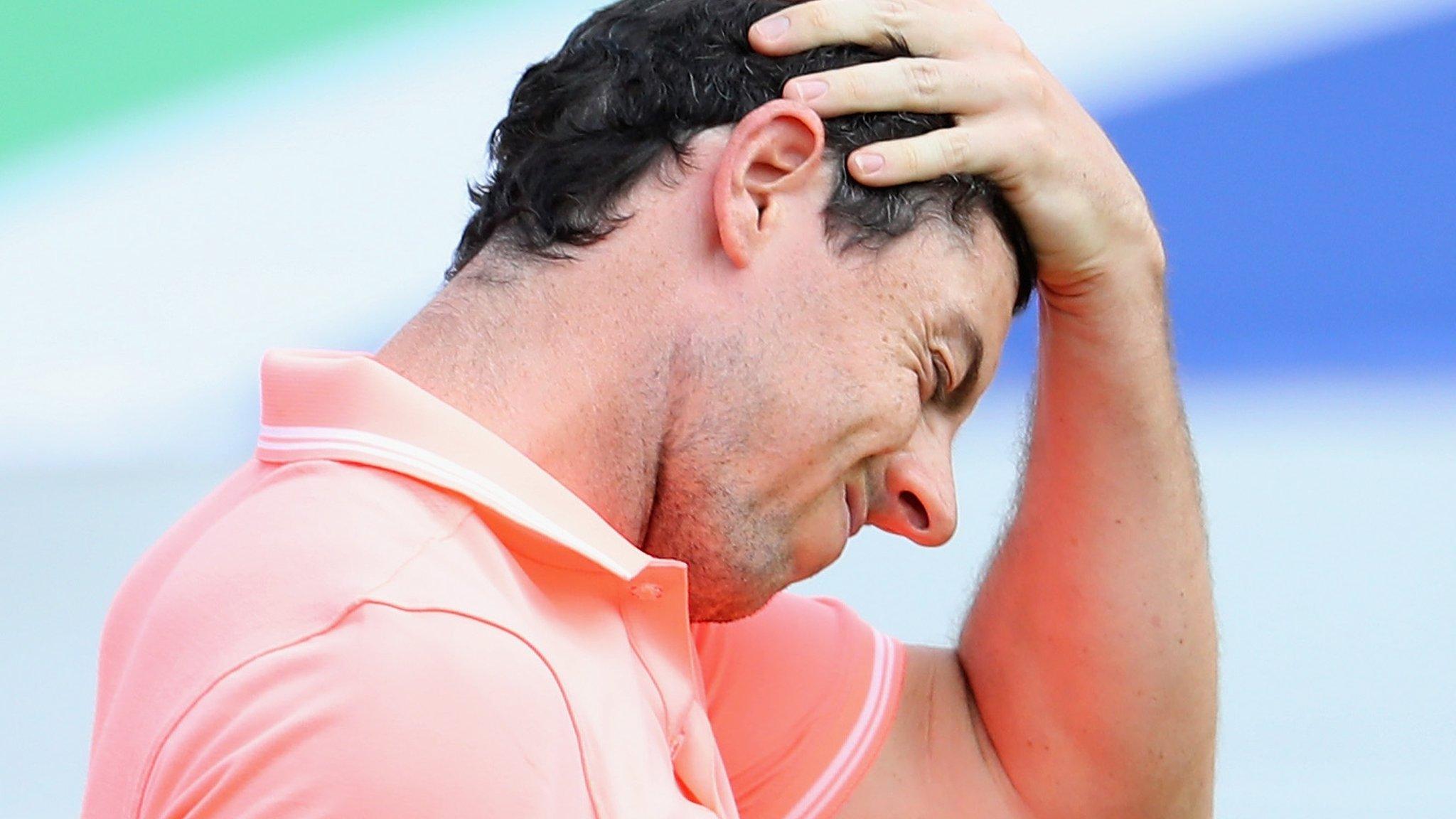Stephen Gallacher raring to go after wretched 2016
- Published
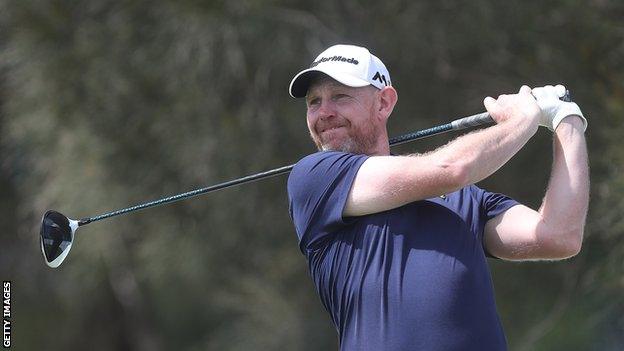
Gallacher is glad to see the back of an injury-interrupted 2016 after falling down the rankings
Halfway through the conversation, after the chat about Muirfield and discrimination and before the talk about Jason Day and slow play, Stephen Gallacher mentions in passing that he will play his 500th European Tour event this week in the desert of Abu Dhabi.
From Gleneagles and the Scottish Open in 1993 to now, sitting in Kingsfield golf centre in Linlithgow, counting the hours to the start of his golfing year, relishing what may lie ahead in a way that he hasn't in a while.
"Five hundred events," he repeats. "What was I? Eighteen? Forty-two now. You know what? In a funny kind of way, it feels like a new beginning, a fresh start," he says.
"I've a new swing, new clubs, new clothing, new shoes, new everything. My pals love me. They've got all last year's gear. New wrist as well. It's fixed. Long road, but we're good. We're raring to go."
'I chipped it round. It was embarrassing'
A year ago, almost to the week, Gallacher headed for Abu Dhabi with his game in the toilet, shot 81 in his opening round, missed the cut by a mile and headed on to Qatar, where he missed another cut.
A week later he fetched-up in Dubai, a course he longed to get back to, a tournament that he had won twice in the previous three years, a golfing nirvana that would surely soothe his problems and set him on the right track again.
No. He shot 70-75 and bowed out early. A fortnight later, in Australia, he took 77 in his opening round in Perth and packed it in. Couldn't continue. Had enough. Came home. In a hurry.
You ask him what the low point of 2016 was and you don't get one specific place or time, you get a list.

Gallacher has good recent form in the Middle East, with two victories in Dubai
There was the death of his mother-in-law and the death of his grandmother. And then there was the injury to the wrist, where the pain shot right up his arm and threatened to do his head in.
"Dubai last year, I shouldn't have played," he recalls. "I almost chipped it round. I was hitting shots I'd never hit before in my life purely because I couldn't get through the ball. I felt like I was embarrassing myself.
"I went to Malaysia, got an injection, which got me through it. Then I went to Australia and couldn't grip the club."
The wrist had been weakened by the plane of his swing.
"When you're hitting down and into golf mats for 20 or 30 years then something gives," he says. "There are two wrist surgeons I kept hearing about. In their field, one was Ronaldo and the other one was Messi. I got put right. Had an operation, put my feet up.
"It was almost a blessing being out because Helen's mum had died and at least I was around to support her. It was a rough old year on and off the course. You don't miss playing for a while, but the hunger comes back.
"I was still out of action in the summer, I got up for the first tee-shot of The Open, watched Monty peg it off and sat the whole day, just me and my son. After that I said to the wee man, 'You know what, I'm getting back into this'."
Gallacher salvaged something from the wreckage of 2016 late in the year; tied for 12th at the British Masters, the same again in Portugal, a top-10 in Australia. It's time to start putting it together again.
'Why would you discriminate against kids?'
Getting back to golf's top table is a powerful motivation in Gallacher's life, but it's not the only one. You get the sense that he would happily talk all day about the things he wants to do - and is doing - to preach the gospel of golf to the next generation.
His foundation is in its early years - Paul Lawrie's foundation was the inspiration behind it - but it's getting stuff done. Seven primary schools get one-on-one coaching from Gallacher's team at the brilliant nine-hole facilities at Kingsfield and Swanston in Edinburgh.
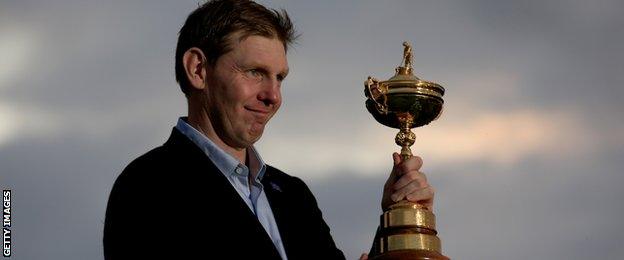
Gallacher was part of the winning European Ryder Cup team at Gleneagles in 2014
This is like Judy Murray's drive to bring tennis to every part of Scotland. Only those who cherish their sport would have the energy and the passion to do this work - and Gallacher has it in abundance.
"We provide the clubs, the balls, the kit, we put it all on for free. I just hate the thought of a kid not being given a chance of playing golf. It might be their sport, but they won't know it unless they're given a chance.
"The schools come here, an hour a week for eight weeks. And that's twice a year. Sixteen hours. They get coaching, they chip and putt, they play fun games, they have a laugh and hopefully you get them hooked.
"The thing I always hated was that you had to be 10-years-old to join a golf club. I think you've lost half the kids by then. I have kids here [in the foundation] who are five and six and they're fantastic. Why would you discriminate against somebody because they're young?
"There's a massive void in golf. The game is in decline. What I'm trying to do is get rid of the narrow-mindedness.
"These kids are the future, but only if you welcome them in. Places like Kingsfield and Swanston take away from the stuffiness. There are still courses in Edinburgh where women can't join. Bruntsfield. Muirfield. Are you kidding me on? It's ludicrous."
'From Jason Day, that's a bit saddening'
A few weeks back, Jason Day, the world number one, was asked about the continuing crisis of slow play. Day, for all his supreme golf, being among the slowest golfers on tour.
The Australian was unapologetic. "I don't care so much about speeding up my game," he said. "I've got to get back to what makes me good. If that means I have to back off five times, I'm going to back off five times before I have to hit the shot."
The thought of an even-slower Day is not one that fills the sport with a whole lot of enthusiasm.
"You've got Jordan Spieth working hard to quicken up his routine because he sees there's a problem there and you have another one almost saying 'I'm going to go slower'," says Gallacher.
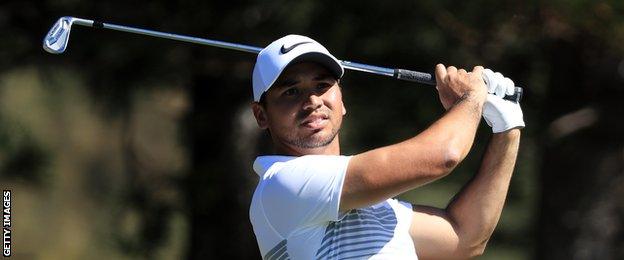
World number one Day is not about to quicken up his game
"One of the most notorious guys who used to be slow was Ben Crane. I played with him in a tournament and he used to carry the chequebook with him and just write the fine out. It might have cost him $100,000 a year, but he's making $2m. I couldn't believe that attitude.
"It's a bit selfish to be honest. Why should the other 155 guys burst their back-sides and stay within the rules when somebody else isn't going to do it? I think he [Day] might regret that. If he's leading by a shot and he gets done a shot penalty and gets beat in the play-off for The Open..."
The prospect of that happening is remote to say the least. The rules are there and they're clear, but they're not enforced, certainly not among the elite of the elite.
Gallacher adds: "Should they hand out shot penalties? Of course they should. It's the rules. It's black and white. There's nothing worse than slow play in golf. You're almost hoping the ref comes out when you're playing with a slow guy. It can muck with your head a bit.
"Hearing comments like that is a bit saddening, really, from the world number one. He has a platform and he can help change the way people see the game. He has the power to promote all the good things about golf and, with this, he's promoting the wrong thing."
Gallacher can tell you that Day is world number one but can't tell you what his own ranking is. He knows he's "miles out of it" but says whatever the figure is, it's irrelevant. He hasn't felt able to do much about it over much of the last year, but that's changing now.
A few good results soon and he's back in business.
"One of the things you wonder about when you're out is whether you'll get the desire back to compete," he says. "There's no problem there. You don't change what I've changed at my age unless you're hungry for it. We'll see where it brings me. "
- Published18 January 2017
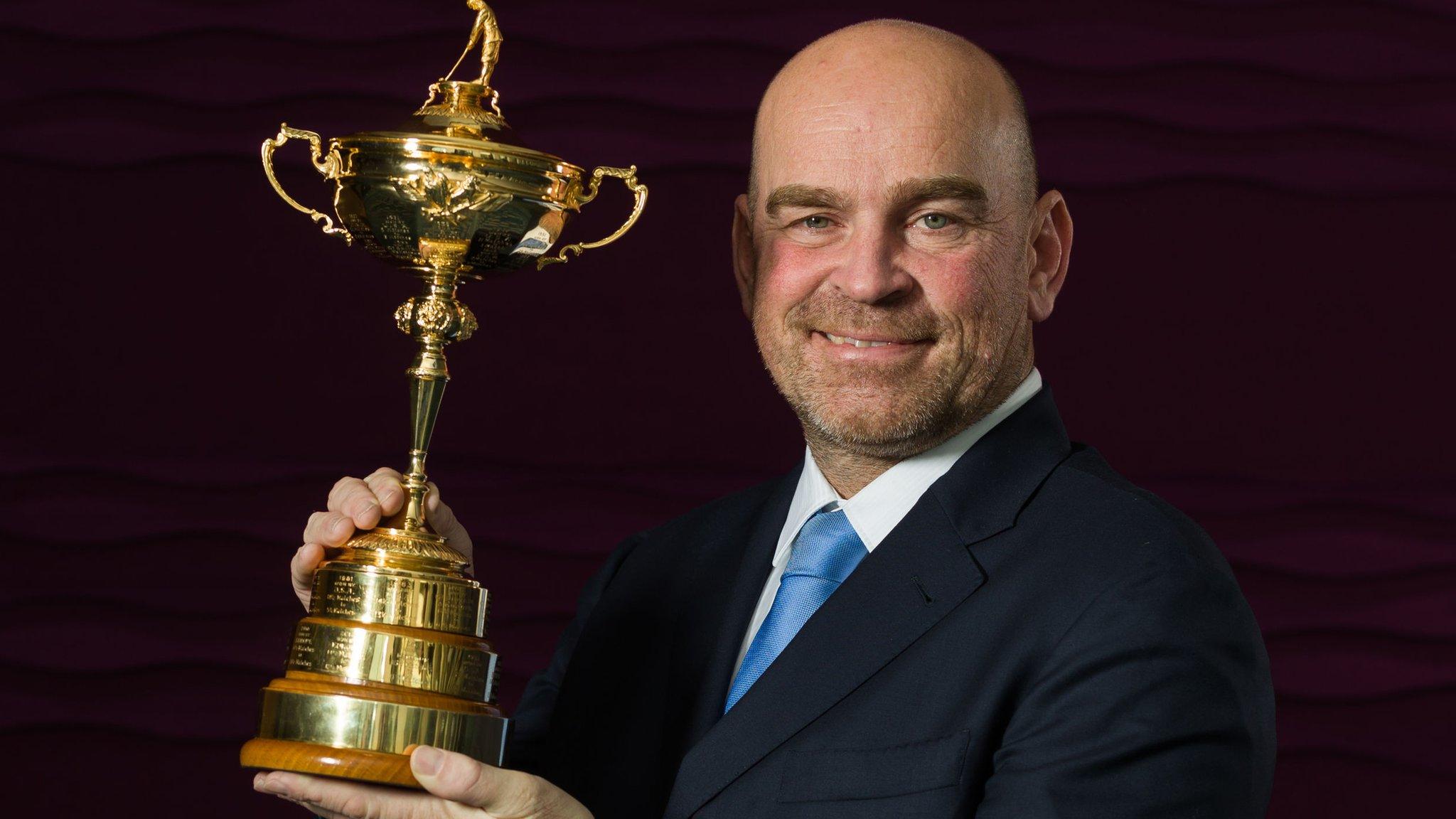
- Published16 January 2017
